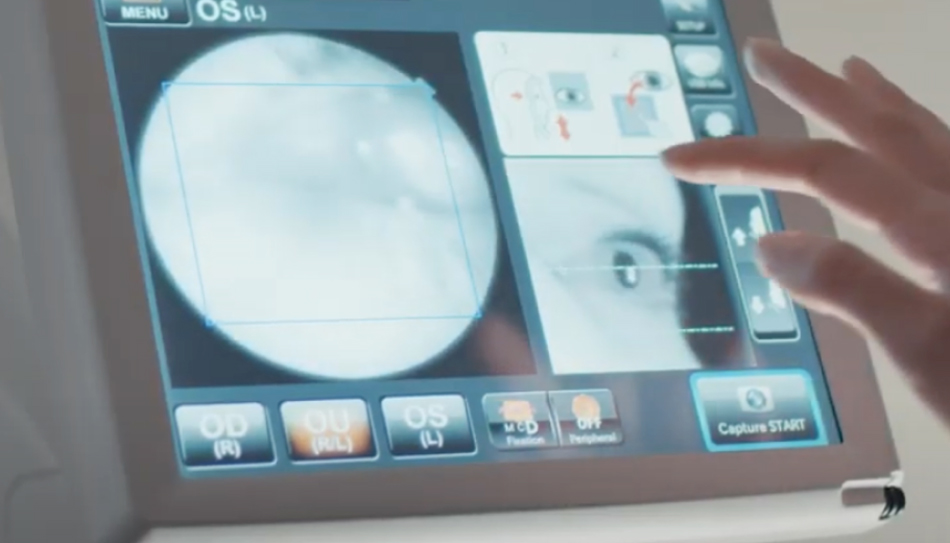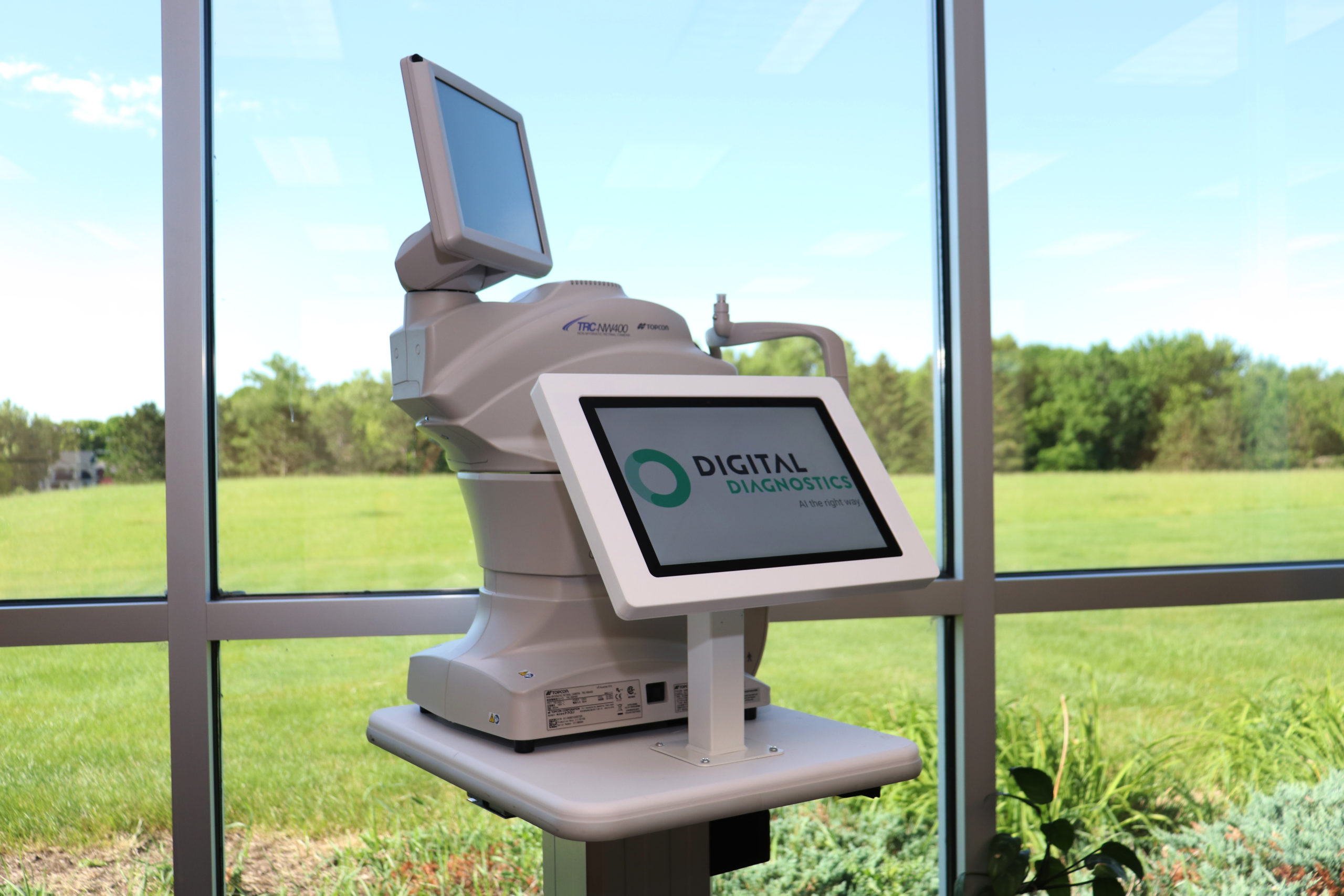
Close Care Gaps, Prevent Blindness
IDx-DR
IDx-DR is an AI diagnostic system that autonomously diagnoses patients for diabetic retinopathy (including macular edema)
With IDx-DR you get:
-
Diagnostic results at the point-of-care
-
No need for specialist overread or telemedicine call backs
-
A simple user interface
-
Customized workflow integration solutions
How IDx-DR Works
1
Using a fundus camera, the trained operator captures two images per eye
2
The images are submitted to IDx-DR



3
IDx-DR analyzes images for signs of diabetic retinopathy (including macular edema), providing results in less than a minute
Results
No diabetic retinopathy detected: Retest in 12 Months
Results
Diabetic retinopathy detected: Refer to an eye care professional
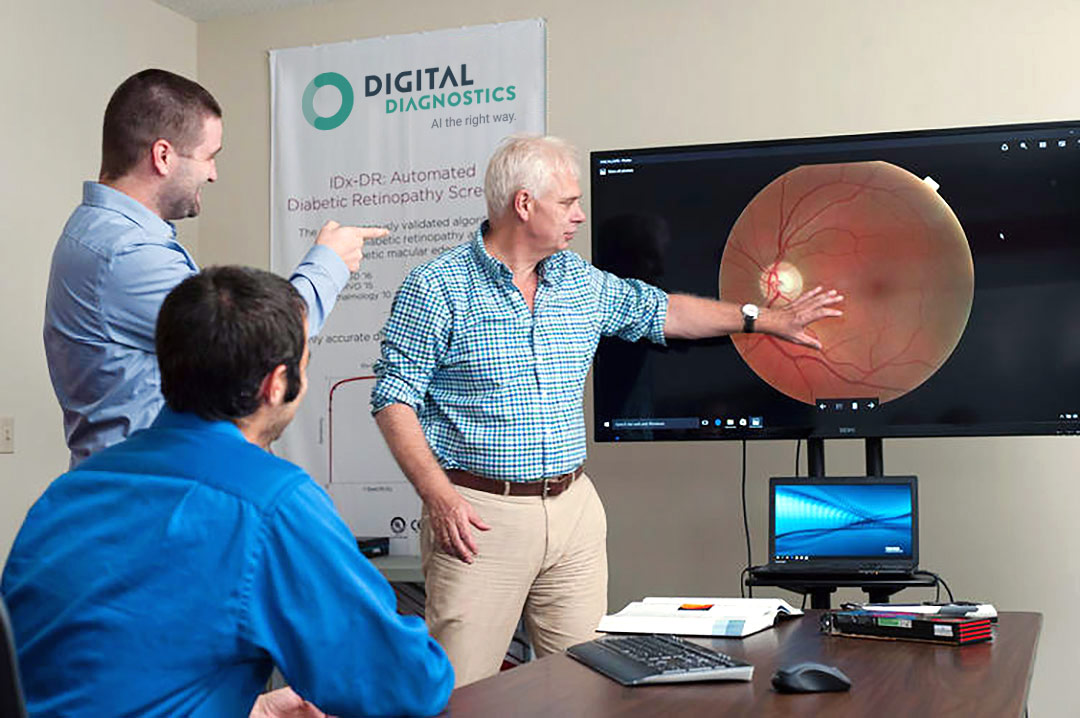
Our Approach to AI Driven Diagnostics
AI the Right Way™
IDx-DR is modeled to look for and make decisions based on the same clinical disease detectors that eye care specialists would use.
-
Diagnostic AI built on an ethical foundation
-
Diagnostic results at the point-of-care
-
Infinitely scalable
High Performance in a
Real-World Clinical Setting
Equitable
IDx-DR has been trained and validated on over 2M images to mitigate bias and ensure the system works equally well for all people, regardless of sex, race, or ethnicity. For more information, read our pivotal trial.
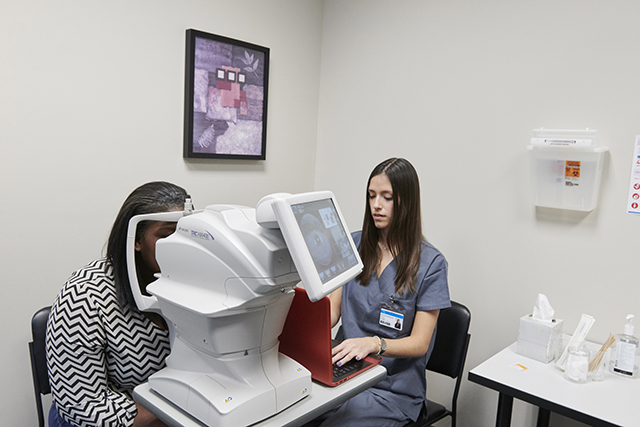
IDx-DR in Action
Digital Diagnostics is impacting patient care across the globe.
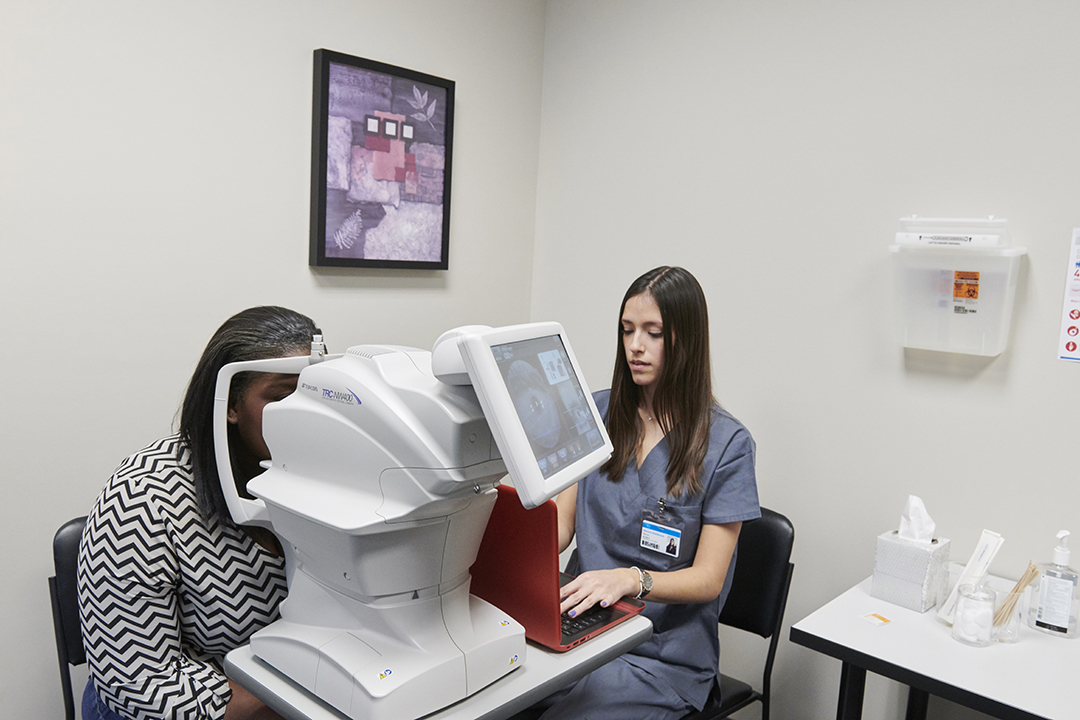
Front-Line Care Providers
IDx-DR is for medical professionals who want to provide patients with rigorously validated and ethically designed diagnostic results at the point-of-care, allowing for more comprehensive diabetes care and improved performance with diabetic eye exam quality measures.
Ophthalmologists & Optometrists
IDx-DR is for eye care providers to help address disparities and improve equity in care as part of the eye exam for people with diabetic retinopathy. IDx-DR results can lead to more actionable referrals, identifying patients with diabetes, not already under the care of an eye care provider, who are most likely to need timely vision saving interventions.
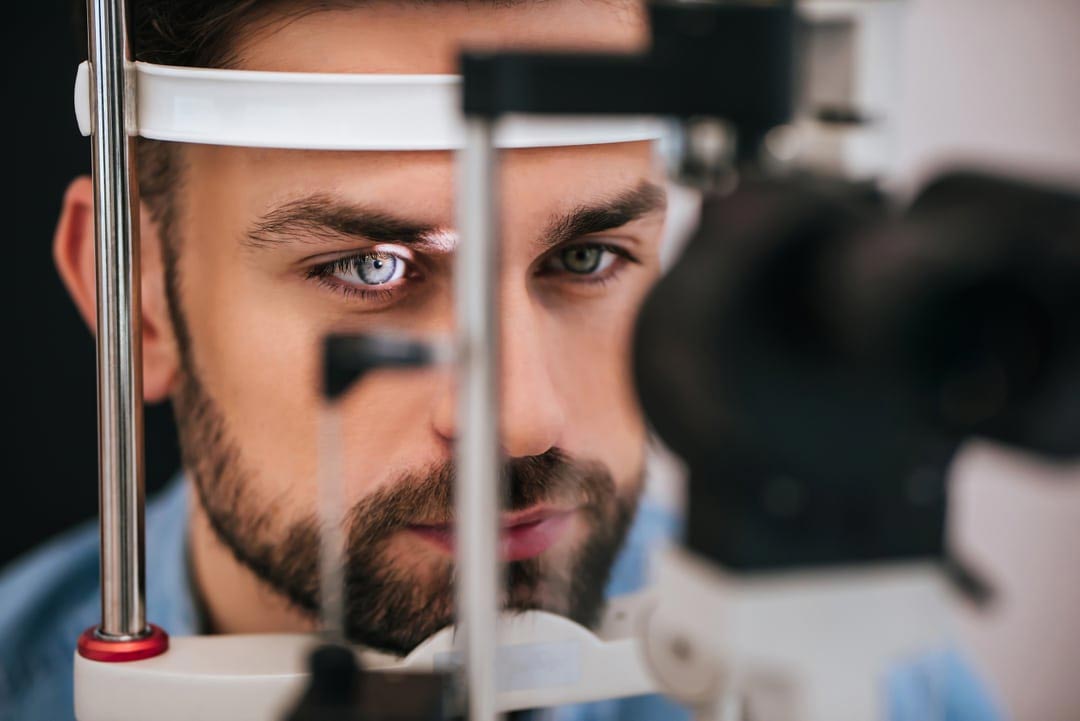

Payor Community
IDx-DR is for payors to improve healthcare efficiency and access to care for enrollees while supporting the Patient Centered Medical Home (PCMH).
-
Cost savings over the life-time of care
-
Prevent blindness through early disease detection
-
100% compliance for DR alone saves > $5B/year
Patients
IDx-DR is for adults (22 years of age or older) diagnosed with diabetes who have not been previously diagnosed with diabetic retinopathy including macular edema and are not currently under the care of an eye care specialist. IDx-DR is installed at point-of-care locations to increase patient access and convenience.
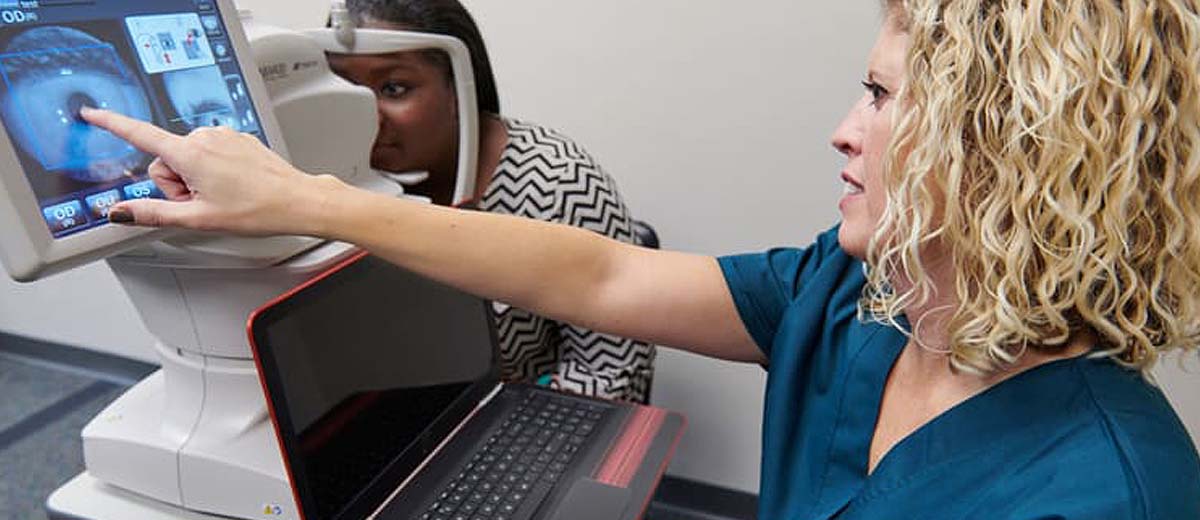
Indications for Use
IDx-DR is intended for use by health care providers to automatically detect more than mild diabetic retinopathy (mtmDR) in adults (22 years of age or older) diagnosed with diabetes who have not been previously diagnosed with diabetic retinopathy. IDx-DR is indicated for use with the Topcon NW400
IDx-DR FAQ
What is IDx-DR?
IDx-DR detects more than mild diabetic retinopathy, which is ETDRS level 35 or higher (including macular edema) at point-of-care to provide the patient with a diagnostic report without a physician evaluation. After completing a rigorous prospective, preregistered clinical trial at primary care sites across the country, IDx-DR became the first and only FDA De Novo-cleared AI diagnostic system to make a diagnosis without physician input. IDx-DR is deployed in point-of-care offices across the globe.
What are the indications for IDx-DR?
IDx-DR is intended for use by health care providers to automatically detect more than mild diabetic retinopathy, which is ETDRS level 35 or higher (including macular edema) in adults (22 years of age or older) diagnosed with diabetes who have not been previously diagnosed with diabetic retinopathy (including diabetic macular edema).
Warnings
- IDx-DR does not replace a full eye exam, but it will find diabetic retinopathy (including diabetic macular edema) that needs to be examined by an eye doctor. Patients who have blurry vision or other symptoms of vision loss should see an eye doctor right away.
- While IDx-DR is reliable, it is not perfect. It is possible that IDx-DR is unable to detect disease that is present, or possibly give a false positive diagnosis.
To review the IDx-DR Indications for Use click here.
How does IDx-DR work?
Using a fundus camera, an operator captures high quality images of the patients’ eyes. The images are then submitted to IDx-DR where they are analyzed for signs of diabetic retinopathy (including diabetic macular edema). A diagnostic result is provided in within the patient encounter at point-of-care with follow up instructions for the patient based on diagnostic outcome. If disease is detected, the patient is referred to an eye care professional during their appointment where they received their diagnosis, which increases the chances a patient will follow through with the referral. If there is no disease detected the patient is advised to get retested in 12 months.
Who is IDx-DR for?
Patients
IDx-DR is for adults (22 years of age or older) diagnosed with diabetes who have not been previously diagnosed with diabetic retinopathy (including diabetic macular edema) and are not currently under the care of an eye care specialist. IDx-DR is installed at point-of-care locations to increase patient access and convenience.
Providers
IDx-DR is for medical professionals who want to provide patients with rigorously validated and ethically designed diagnostic results at the point-of-care, allowing for more comprehensive diabetes care and improved performance with eye exams for people with diabetes quality measures.
Payors
IDx-DR is for payors to improve healthcare efficiency and access to care for enrollees while supporting the Patient Centered Medical Home (PCMH).
Eye Care Providers
IDx-DR is for eye care providers to help address disparities and improve equity in care as part of the diabetic eye exam delivery model. IDx-DR results can lead to more actionable referrals, identifying patients with diabetes not already under the care of an eye care provider, who are most likely to need timely vision saving interventions.
